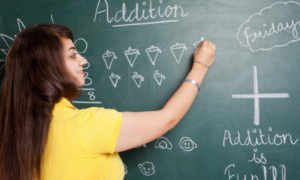
Classroom accommodations for dyscalculia
The school plays an important part in managing children with learning disabilities. The school administration and the teachers can provide the following classroom accommodations for dyscalculia to help out struggling children:
Classroom accommodations for dyscalculia
- Permitting extra time on tests may help the child as they will not feel rushed or under too much pressure to perform in too little time, and benefit students for whom time restrictions may be a roadblock to learning.
- Frequent checks of classwork will decrease a child’s frustration and provide constant feedback to learn from their mistakes and develop a sense that they can improve.
- Assigning partners or do one on one testing
- Schools can provide a special educator who can work along with the child, breaking and listing the steps involved in solving an equation or problem.
- Provision of recorded lectures to students in need may also be beneficial.
- Providing sample problems and extra examples for reference while ensuring that the assigned problems are not too many or too burdening for the child can help better the student’s understanding and make assessment easier.
- If possible, the use of a calculator should be allowed. CBSE has permitted the use of a calculator for students with dyscalculia in board exams.
- Multisensory learning, i.e. using senses like touch, vision, and audio to teach math concepts, helps children struggling with dyscalculia a lot. Successful use of these sensibilities may help them understand the nuances of mathematics and improve their confidence in the subject.
- To avoid students shutting down or getting overwhelmed due to anxiety, they can provide them with plenty of opportunities to maximise engagement. Creatively demonstrate concepts that let them physically (hear, touch) experience concepts.
- Teaching maths like a foreign language – focus on vocabulary and its reinforcement
- Specific devices and tools, like the abacus, can effectively improve number sense.
Along with providing the above classroom accommodations for dyscalculia, teachers should also provide constant feedback to the student about where they went wrong and how addressing that can turn out to be helpful.